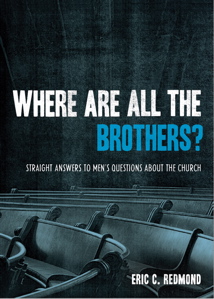 Eric C. Redmond is Senior Pastor of Reformation Alive Baptist Church in Temple Hills, MD. He is formerly Assistant Professor of Bible and Theology at Washington Bible College, Lanham, MD. Effective July 1, he will be Executive Pastoral Assistant and Bible Professor in Residence at New Canaan Baptist Church in Washington, DC. Some time ago he published a book called Where Are All the Brothers?: Straight Answers to Men’s Questions about the Church. I had the privilege of asking him a few questions about it. I’ll be posting the first part of our interaction now, and the remainder next week.
Eric C. Redmond is Senior Pastor of Reformation Alive Baptist Church in Temple Hills, MD. He is formerly Assistant Professor of Bible and Theology at Washington Bible College, Lanham, MD. Effective July 1, he will be Executive Pastoral Assistant and Bible Professor in Residence at New Canaan Baptist Church in Washington, DC. Some time ago he published a book called Where Are All the Brothers?: Straight Answers to Men’s Questions about the Church. I had the privilege of asking him a few questions about it. I’ll be posting the first part of our interaction now, and the remainder next week.
What prompted you to write the book, Where Are All the Brothers?
The book arose out of pastoral concern for absentee men associated with a church where I was serving. I saw wives and mothers without husbands and fathers present. When I would probe as to the reason(s) for the absenteeism, I found that there were objections to the church – objects that were common among African American men in particular. The book is a humble attempt to answer the objections of these men in a culturally sensitive approach.
Do you have any statistics for church attendance among African-American men versus other men?
In a variety of settings I have said that African American men represent one of the most unreached people groups in North America. I have no statistics to prove this, but only what is culturally observable by many across the country.
However, there are statistics on other social indicators that reflect the spiritual impoverishment of African American men, such as higher than average incarceration rates and homicide rates (for certain ages brackets), and lower than average educational progress rates. Theses numbers, and the decline in marriages in our community reveal that the power of the church’s message – the Gospel – is missing from the lives of African American men.
Moreover, there is a growing pushback from within the African American community against the lack of marriageable men in the African American church, and against marriage itself (although the are dissenting voices and signs of hope from someone like Kea Taylor). Men not seeking marriage, being available for marriage, and/or deserting marriage are spiritual problems at their root (cf. 1 Tim. 4:3; Heb. 13:4). Both the National Black Church Initiative and the Methodist Denominations within the African American community have sought to counter the decline of African American male attendance in the church.
Believers in America, regardless of color, nationality, or ethnicity, should be aware of the spiritual poverty behind these grim stats and alarmed by them. They should respond to them with the sort of Great Commission zeal that they would have if their own communities were witnessing the erosion of men – and thus male leadership – from its community structures—the church, the family, the academy, and the workforce. They should think of what having godly men in their churches and homes means for their children and grandchildren, and the future of their own communities. Then, knowing that this is not the present or future for the African American community as it current stands, they should feel burdened to reach African American men, young men, and boys with the Gospel and on-going Gospel-centered discipleship.